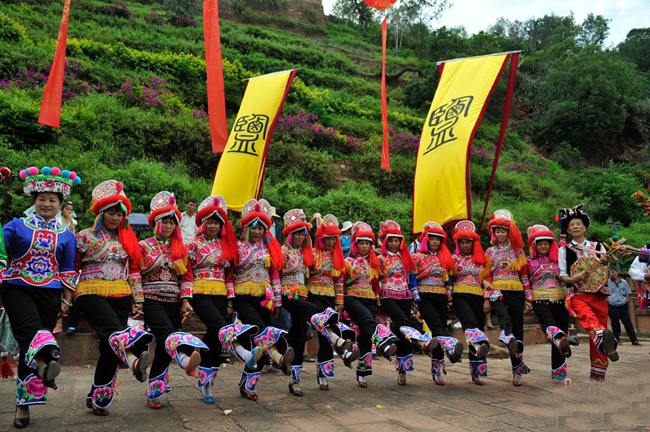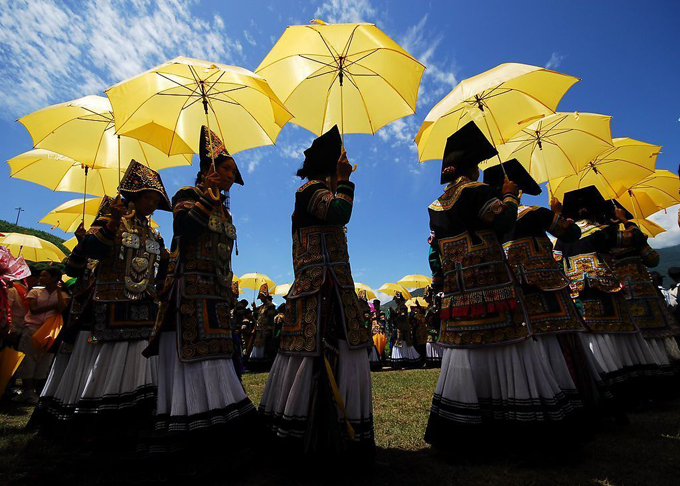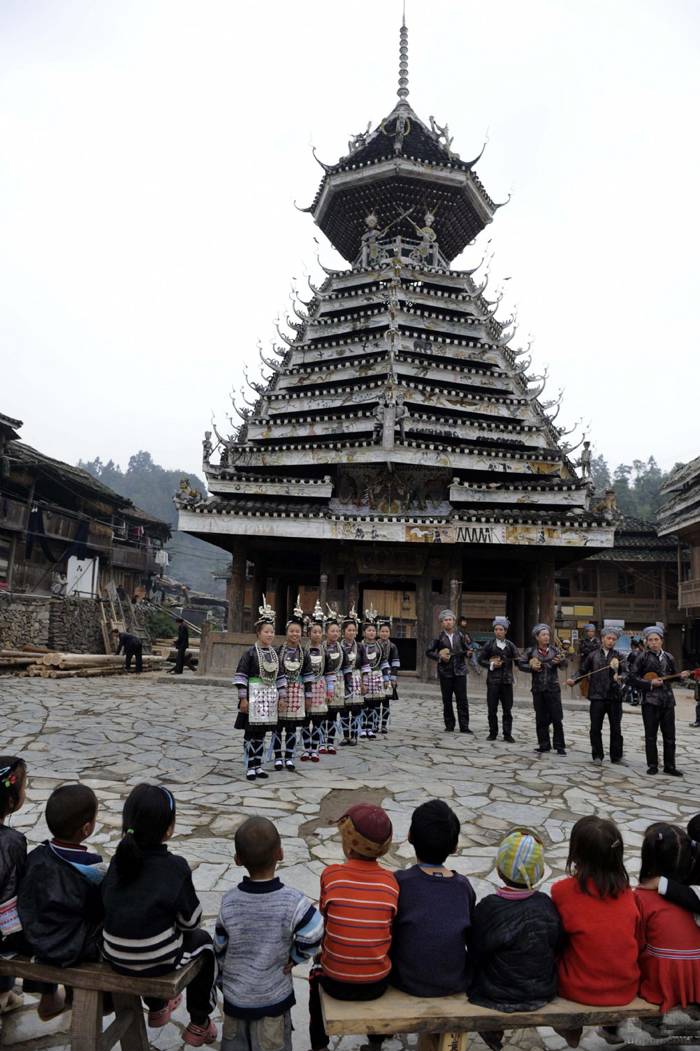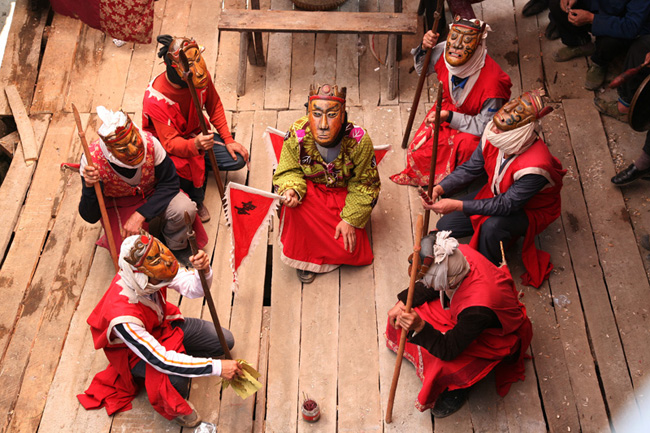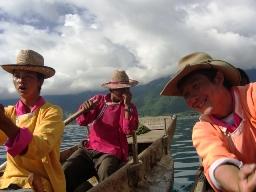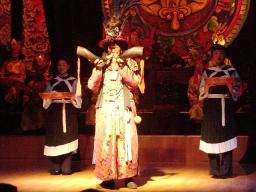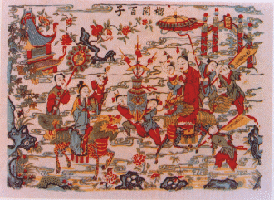Goddess of Thunder Worship Festival (Han Tian Jie)
2015-09-09 12:45:23 Author:culture Source:National culture Browse number:314 Comment 0 A
Huanggang Dong Village is the birthplace of Goddess of Thunder Worship Festival. It occurs on the fifteenth day of the sixth lunar month. On this day, villagers will butcher pigs to prepare a banquet
Huanggang Dong Village is the birthplace of Goddess of Thunder Worship Festival. It occurs on the fifteenth day of the sixth lunar month. On this day, villagers will butcher pigs to prepare a banquet and carry out a solemn worship ceremony by chanting towards sky for forgiveness and blessing from Goddness of Thunder, who is in charge of rain and a good harvest according to Dong people.
Presided over by a priest, they will chant the lyrics like this: “ Saxiang, we are here to ask for forgiveness and to wash your face, sorry that we make you face dirty.” If it rains, it means their god has forgiven them and the chant can halt immediately. This ritual is followed by a Long Table Banquet, Kam Grand Choirs, bull fighting, Tai Guan Ren and Reed-pipe singing and dancing. You can also experience their unique love custom named Xing Ge Zuo Ye, during which young girls and lads sit together during late night, cultivating love through singing songs till day breaks. This annual festival draws more and more participants each year.
The best-preserved Dong architecture, lifestyle and festivals
Drum towers, wind-rain bridges, stilt houses, tie dye tanks and rice stands, the defining elements of any Dong village, can be found here, in the superb condition. Everything here is authentic and real, true to its past and natural character.
Villagers live in Stilt Houses, a gem of folk residence prevailing in southwest China’s hilly areas where arable land is scarce and prized like gold. Fragrant Glutinous Rice, a glutinous rice native to this village, serves as the main diet. A myriad snacks and drinks can be made from this most versatile food, such as Zongzi (glutinous rice dumpling) and rice wine. Featuring aromatic taste and extremely high nutritional value, it is a must-eat during your visit here. For globetrotter foodies, they will find typical Dong delicacies including pickled fish, pork and vegetables irresistible. Yangbie (a dish seasoned with the liquid from a goat’s stomach), however, is not for the faint-of-heart. (click to read more on Dong cuisine…)
When wandering around this village, you will notice many black or blue fabrics hanging on the ropes and fluttering in the wind. They are the home-made fabrics of Dong people, which feature shiny luster and can last for decades. Dong ethnic attires made from these fabrics mirror a perfect blend of simplicity and grace. The palette of black, dark grey or blue is balanced off by delicate rainbow-colored embroidery and other accessories such as belts, headgears, embroidered shoes and silver ornaments. In Huanggang Dong Village, you can have the privilege to see the clothes-making process, such as weaving, spinning and dying.
First: even after marriage, girls cannot stay with their husbands till they are pregnant
Second: kids are raised by their grandfathers and grandmothers till they are four to five years old, because their parents are busy with labor from dawn to dark, so they seldom see each other.
Third: Huanggang Dong villagers feed on Fragrant Glutinous Rice. In their opinion, rice is for pigs. (Chinese have been pigs for thousands of years, if their saying is right).
Fourth: unroofed toilets are built upon fish ponds, from where you can enjoy fresh air and overlook the fish. This is one the most poetic and eco-friendly toilets I ever heard of.
Get Around: Huanggang Dong Village is 22km from Zhaoxing Dong Village(the biggest Dong Village on earth), 5km from Xiaohuang Dong Village(the paradise of Kam Grand Choirs, which boasts over 1000 folk singers).
Presided over by a priest, they will chant the lyrics like this: “ Saxiang, we are here to ask for forgiveness and to wash your face, sorry that we make you face dirty.” If it rains, it means their god has forgiven them and the chant can halt immediately. This ritual is followed by a Long Table Banquet, Kam Grand Choirs, bull fighting, Tai Guan Ren and Reed-pipe singing and dancing. You can also experience their unique love custom named Xing Ge Zuo Ye, during which young girls and lads sit together during late night, cultivating love through singing songs till day breaks. This annual festival draws more and more participants each year.
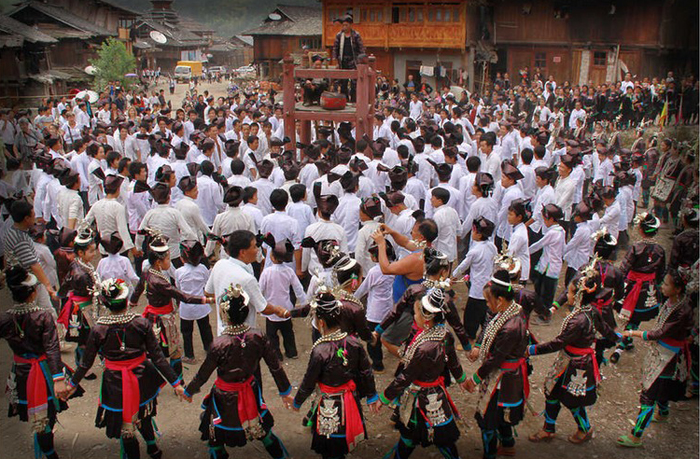 |
The best-preserved Dong architecture, lifestyle and festivals
Drum towers, wind-rain bridges, stilt houses, tie dye tanks and rice stands, the defining elements of any Dong village, can be found here, in the superb condition. Everything here is authentic and real, true to its past and natural character.
Villagers live in Stilt Houses, a gem of folk residence prevailing in southwest China’s hilly areas where arable land is scarce and prized like gold. Fragrant Glutinous Rice, a glutinous rice native to this village, serves as the main diet. A myriad snacks and drinks can be made from this most versatile food, such as Zongzi (glutinous rice dumpling) and rice wine. Featuring aromatic taste and extremely high nutritional value, it is a must-eat during your visit here. For globetrotter foodies, they will find typical Dong delicacies including pickled fish, pork and vegetables irresistible. Yangbie (a dish seasoned with the liquid from a goat’s stomach), however, is not for the faint-of-heart. (click to read more on Dong cuisine…)
When wandering around this village, you will notice many black or blue fabrics hanging on the ropes and fluttering in the wind. They are the home-made fabrics of Dong people, which feature shiny luster and can last for decades. Dong ethnic attires made from these fabrics mirror a perfect blend of simplicity and grace. The palette of black, dark grey or blue is balanced off by delicate rainbow-colored embroidery and other accessories such as belts, headgears, embroidered shoes and silver ornaments. In Huanggang Dong Village, you can have the privilege to see the clothes-making process, such as weaving, spinning and dying.
 |
 |
Four Odds
First: even after marriage, girls cannot stay with their husbands till they are pregnant
Second: kids are raised by their grandfathers and grandmothers till they are four to five years old, because their parents are busy with labor from dawn to dark, so they seldom see each other.
Third: Huanggang Dong villagers feed on Fragrant Glutinous Rice. In their opinion, rice is for pigs. (Chinese have been pigs for thousands of years, if their saying is right).
Fourth: unroofed toilets are built upon fish ponds, from where you can enjoy fresh air and overlook the fish. This is one the most poetic and eco-friendly toilets I ever heard of.
Get Around: Huanggang Dong Village is 22km from Zhaoxing Dong Village(the biggest Dong Village on earth), 5km from Xiaohuang Dong Village(the paradise of Kam Grand Choirs, which boasts over 1000 folk singers).
 |
 |
On A: Kam Grand Choirs
Next article: Yao Nationality Music and Dances
Already existing0Comment
Review all comments>>


